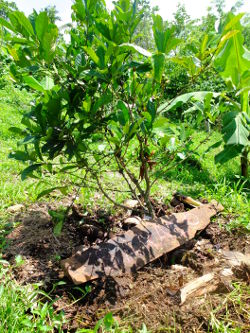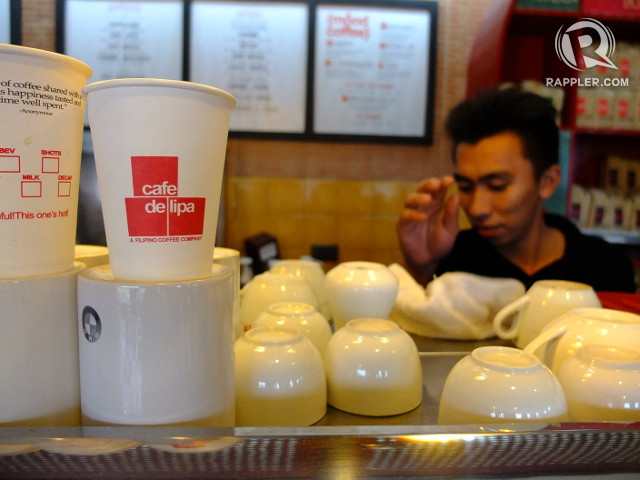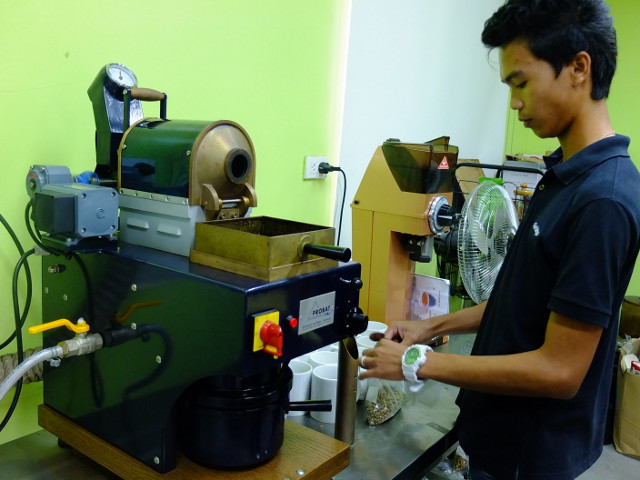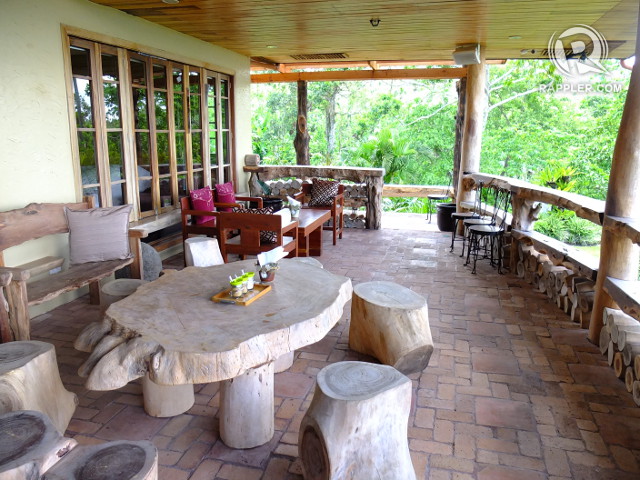SUMMARY
This is AI generated summarization, which may have errors. For context, always refer to the full article.
BATANGAS, Philippines – Twenty-year-old Vladimir Eola waits for the tell-tale popping sound from inside the coffee bean roaster that lets him know when he can take out the beans depending on how roasted he wants them.
It’s a medium roast so he doesn’t wait long. When he lets out the bronzed Barako beans, curls of smoke waft from the opened roaster, bringing with them a fragrance both heady and sobering.
Barely out of his teens, Eola is already a coffee expert. He can tell the difference between the 4 types of coffee beans grown in the country. He knows how to raise a coffee plant from seed to tree. And if you insist, he’ll even whip up some latte art for your morning cup.
Eola is one of the first to graduate from the Coffee Academy in Lipa, Batangas, on March 2014. Along with 33 others, he completed courses in coffee farming, coffee processing, coffee marketing, food and beverage services, barista skills and coffee farm tour-guiding.
Some of his other batchmates are baristas too or coffee technicians teaching coffee farming in other parts of the country.
The Coffee Academy is offered as a vocational course for grade 11 and 12 students in Pinagtong-ulan National High School in Lipa. Under K-to-12, senior high school students take vocational studies apart from their regular subjects to prepare them for work should they decide a college education is not for them.
Though K-to-12 is not yet fully implemented, Pinagtong-ulan National High School was chosen as a pilot school and Coffee Academy its pilot vocational course, said Coffee Academy School Coordinator Nancy Noveno.
“In the morning we are teaching English, Science, Math and the other regular subjects. In the afternoon, we are offering the technical subjects under a TESDA instructor,” she told Rappler.
The academy is a joint project of the Department of Education that wants to prepare students for employment, and the Department of Agriculture that wants to develop coffee as one of the country’s priority high-value crops.
On the day this reporter visited the school, the grade 11 Coffee Academy students were in their Food and Beverage Services class, one of the academy’s basic courses.
Dressed in waiter and waitress outfits, they watched the TESDA instructor demonstrate how to fold a dining table napkin into various shapes: pyramid, banana, candle.
Come second semester, it’s off to the nearby coffee plantation owned by the Mercado family who have been farming and selling Lipa coffee for 3 generations. (READ: A coffee journey: From the farm to your cup)
Under the supervision of Joe Mercado and his son Omar, the students learn how to plant coffee seedlings, maintain them and harvest the beans.
Tracing coffee history
In Coffee Academy, the history of Lipa comes full circle, said Noveno.
“We are tracing history here. This is where the first coffee tree was planted which means this is also where the first Coffee Academy should be established. Now, we have to revive and bring back the lost glory of barako coffee.”
A Franciscan friar planted the Philippines’ first barako coffee tree in the village of Pinagtong-ulan in the 1700s. Lipa’s volcanic soil (the city is near Taal Volcano), low temperature and cultivation practices gave rise to the distinct Batangas kapeng barako described by Omar Mercado as “aromatic, full-bodied and strong-flavored.”
In the 1880s, Lipa became the Philippines’ coffee capital, even becoming one of the world’s top coffee producers. In fact, from 1887 to 1889, Lipa was the world’s only coffee supplier because a fungal virus destroyed the coffee plantations in Africa, Java and Brazil, according to the Lipa tourism website.

But in the late 1800s, coffee rust, a disease that causes the withering of coffee tree leaves, decimated Lipa’s coffee plantations, putting an end to the short-lived industry. To this day, it has not fully recovered. From one million coffee trees in its heyday, Lipa now has only around 100,000, according to Joe Mercado.
Brewing change
But the Coffee Academy may turn things around. The elder Mercado thinks it may encourage more Lipeño youths to take up coffee farming.
“When I am asked for my occupation, I say I am a farmer first and then a businessman. I’m proud to be a farmer because that’s how I earned my wealth. I was able to finish school because of coffee, I’ve had houses built and bought land using coffee,” he told Rappler.
Mercado owns 30 hectares of land with a clear view of Taal Lake, reachable through an elaborately designed metal gate. On a portion of this land stands his and his wife’s house full of modern wooden furniture and guarded by two German Shepherds.
His comfortable, even luxurious lifestyle, is enough to challenge the common perception that a farmer is destined for poverty.
It’s this perception that scares many young Filipinos from venturing into farming or agriculture.
From coffee farming and trading, the Mercado family has created their own brand of coffee, called Café de Lipa, and opened 4 café branches.
Eola works as a barista in the main branch in Lipa, helping promote his hometown’s coffee with every cup he brews for customers.
Jessa Atinado, a grade 11 student, is just starting her journey with the Coffee Academy. Dressed in the waitress outfit from her afternoon class, she tells this reporter her dreams.
She wants to teach her father, a vegetable farmer, how to plant coffee.
She said, “’Pag natuto na siya ng pagtatanim ng kape, magkakaroon po kami ng gawaan ng kape. Ganoon lang po kasi ang gusto ko, magkaroon po kami ng negosyo na about sa coffee. Kaya po gusto ko po dito grumaduate.”
(When he learns how to plant coffee, we can have our own coffee-making business. That’s all I want, for us to have a business in coffee. That’s why I want to graduate from here.) – Rappler.com
Add a comment
How does this make you feel?



There are no comments yet. Add your comment to start the conversation.